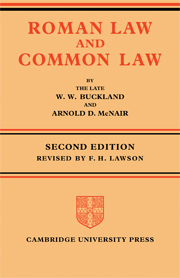Book contents
- Frontmatter
- Contents
- Preface
- Preface to the Second Edition
- Note on the 1965 Impression
- Introduction
- Abbreviations
- Chapter I THE SOURCES
- Chapter II THE LAW OF PERSONS
- Chapter III LAW OF PROPERTY
- Chapter IV LIMITED INTERESTS AND SERVITUDES
- Chapter V UNIVERSAL SUCCESSION
- Chapter VI OBLIGATIONS: GENERAL
- Chapter VII OBLIGATIONS: GENERAL (cont.)
- Chapter VIII PARTICULAR CONTRACTS
- Chapter IX QUASI-CONTRACT AND NEGOTIORUM GESTIO
- Chapter X DELICT AND TORT
- Chapter XI PARTICULAR DELICTS AND TORTS
- Chapter XII PROCEDURE
- Index
Chapter V - UNIVERSAL SUCCESSION
Published online by Cambridge University Press: 30 March 2010
- Frontmatter
- Contents
- Preface
- Preface to the Second Edition
- Note on the 1965 Impression
- Introduction
- Abbreviations
- Chapter I THE SOURCES
- Chapter II THE LAW OF PERSONS
- Chapter III LAW OF PROPERTY
- Chapter IV LIMITED INTERESTS AND SERVITUDES
- Chapter V UNIVERSAL SUCCESSION
- Chapter VI OBLIGATIONS: GENERAL
- Chapter VII OBLIGATIONS: GENERAL (cont.)
- Chapter VIII PARTICULAR CONTRACTS
- Chapter IX QUASI-CONTRACT AND NEGOTIORUM GESTIO
- Chapter X DELICT AND TORT
- Chapter XI PARTICULAR DELICTS AND TORTS
- Chapter XII PROCEDURE
- Index
Summary
INTRODUCTORY
The word ‘succession’, at least in the sense in which it was used by the Romans, is not traditional in our private law. Bracton, under Roman influence, employs successio and succedere in describing the transfer of an estate in lands by inheritance, but later it becomes usual to speak of descent in real property and of administration, distribution and title by will in personal property. Littleton uses the word ‘successors’ in relation to what we should now call corporations sole, that is, in relation to succession virtute officii. The Termes de la Ley and Cowell's Interpreter know nothing of it. Blackstone speaks of succession ab intestato and applies it to both real and personal property, but with the protest that the expression is in strict propriety applicable only to the continuous succession of members of corporate bodies which never die. Nowadays it is usual and may be said to be technical, especially in connexion with the duties payable on devolution of property at death, e.g. the recently abolished ‘succession duty’. In Rome, while it was also used for succession to office and the like, it was the term commonly used from the latter days of the Republic onwards to express the devolution of property on death and in certain analogous cases.
- Type
- Chapter
- Information
- Roman Law and Common LawA Comparison in Outline, pp. 143 - 192Publisher: Cambridge University PressPrint publication year: 1952

